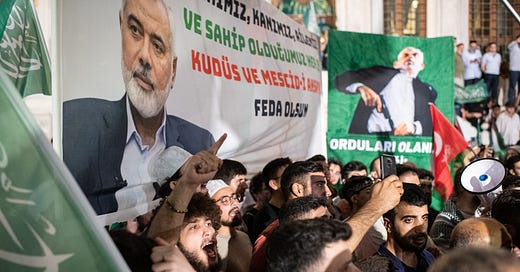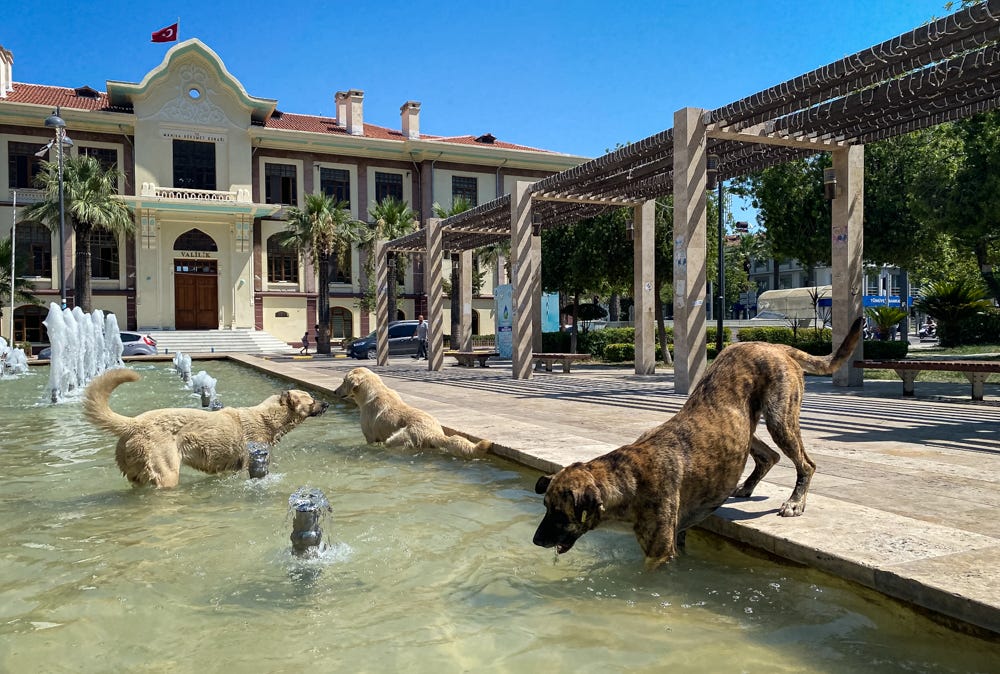Hello! Parliament is going on summer break, and so is this newsletter. For the next two weeks, we’ll be away with permission from the news cycle – which pretty much acts like this cat.
We’ll be back the week of Aug. 19. Thank you again to everyone who makes Turkey recap possible. Stay safe and stay well!
In this week’s recap:
Turkey responds to Haniyeh assassination
Street dog law and municipal debts on the agenda
Kurdish traffic sign dispute in southeast
Updates on Syria, Greece and Armenia talks
Erdoğan’s Olympic “Nope”
Also from us this week:
Gonca Tokyol on how Manisa’s new CHP mayor flipped the province in local elections
Tomorrow: Azra Ceylan on Turkey’s new tax package and more in our Economy recap
Thousands of protestors rallied against the Israel-Gaza war throughout Turkey Wednesday night following the assassination of Hamas political leader Ismail Haniyeh.
Amid calls to end western support for Israel, demonstrators in İstanbul chanted ‘Vur, Vur, Tel Aviv'i Vur’ meaning ‘Hit, hit, Tel Aviv, hit’ and ‘Hamas'a Selam, Direnişe Devam’ or ‘Greetings Hamas, continue the resistance.” At times, the word ‘resistance’ was replaced with ‘jihad’.
As for the Hamas leadership, reports indicate Khaled Meshaal may soon take over Haniyeh’s role. Long-time Turkey watchers will recall Meshaal has met several times with Erdoğan and former Turkish PM Ahmet Davutoğlu.
Meshaal was also a frequent visitor to İstanbul, where he conducted meetings in the recent past. Now, he reportedly divides his time between Doha and Cairo.
More generally, fallout from the Haniyeh assassination raises the prospects for a wider regional war after Iran threatened retaliatory strikes on Israel. The event also raises pressure on Erdoğan to act, and this comes after Israel’s foreign minister said Erdoğan “follows in the footsteps of Saddam Hussein” by threatening Israel.
It’s been a long week, so let’s recap the three main developments on the Turkey-Israel-Palestine front:
First: Erdoğan Sunday said Turkey might intervene in Israel, without specifying how but the examples he used suggest it would go beyond humanitarian aid.
“Just like we entered Karabakh, just like we entered Libya, we might do similar to them [Israel]," Erdoğan told AKP members in Rize.
The statement prompted backlash from Israel, including the Saddam comparison above, which then prompted counter-backlash from Ankara.
Gallia Lindenstrauss, a senior research fellow at the Tel Aviv-based Institute for National Security Studies (INSS), wrote Erdoğan’s intervention comment was likely driven by “growing Turkish frustration with the continuation of the war in Gaza and … the fact that Turkey has a marginal influence on the course of events.”
Second: During the same event Sunday, Erdoğan demanded an apology from Palestinian Authority Pres. Mahmoud Abbas, who apparently refused an invitation to speak in Turkish parliament.
Following Wednesday’s assassination, Turkish officials said Abbas had agreed to visit Turkey Aug. 14-15 to meet with Erdoğan and address the Turkish parliament.
Third: The assassination. Haniyeh last met Erdoğan in April and took part in a trilateral with Abbas last July. Following the news Wednesday, Erdoğan said that “Zionist barbarism will not achieve its goals”, vowing to continue supporting Palestinians.
In a live interview Wednesday, FM Fidan said, “that by killing him [Haniyeh], they also killed peace,” joining other top Ankara officials in condemning Israel. CHP chair Özgür Özel and jailed former HDP co-chair Selahattin Demirtaş also shared statements.
Tuba Eldem, assoc. prof. of political science at Fenerbahçe University, told Turkey recap that Erdoğan’s rhetoric on the Israel-Gaza conflict is meant for both foreign and domestic audiences, serving distinct purposes to bolster his image with both camps and the broader Islamic ummah.
“The ruling coalition’s efforts to construct a new national identity based on Turkic-Islamic civilization and the shift of Turkey’s status-seeking strategy towards competition with the West are central to understanding Erdoğan’s recent declarations about Israel,” Eldem said.
“To put it in another way, to get recognition of Turkey’s emerging power status, Erdoğan wants Turkey to assume an active and determinant position in every issue in the region,” she added. “Domestically, Erdoğan seeks to divert attention from the economic woes by appealing to neo-nationalist and pro-Islamic sentiments.”
– Diego Cupolo
Paw enforcement: Street dog law and municipal debts on the agenda
Keep reading with a 7-day free trial
Subscribe to Turkey recap to keep reading this post and get 7 days of free access to the full post archives.





